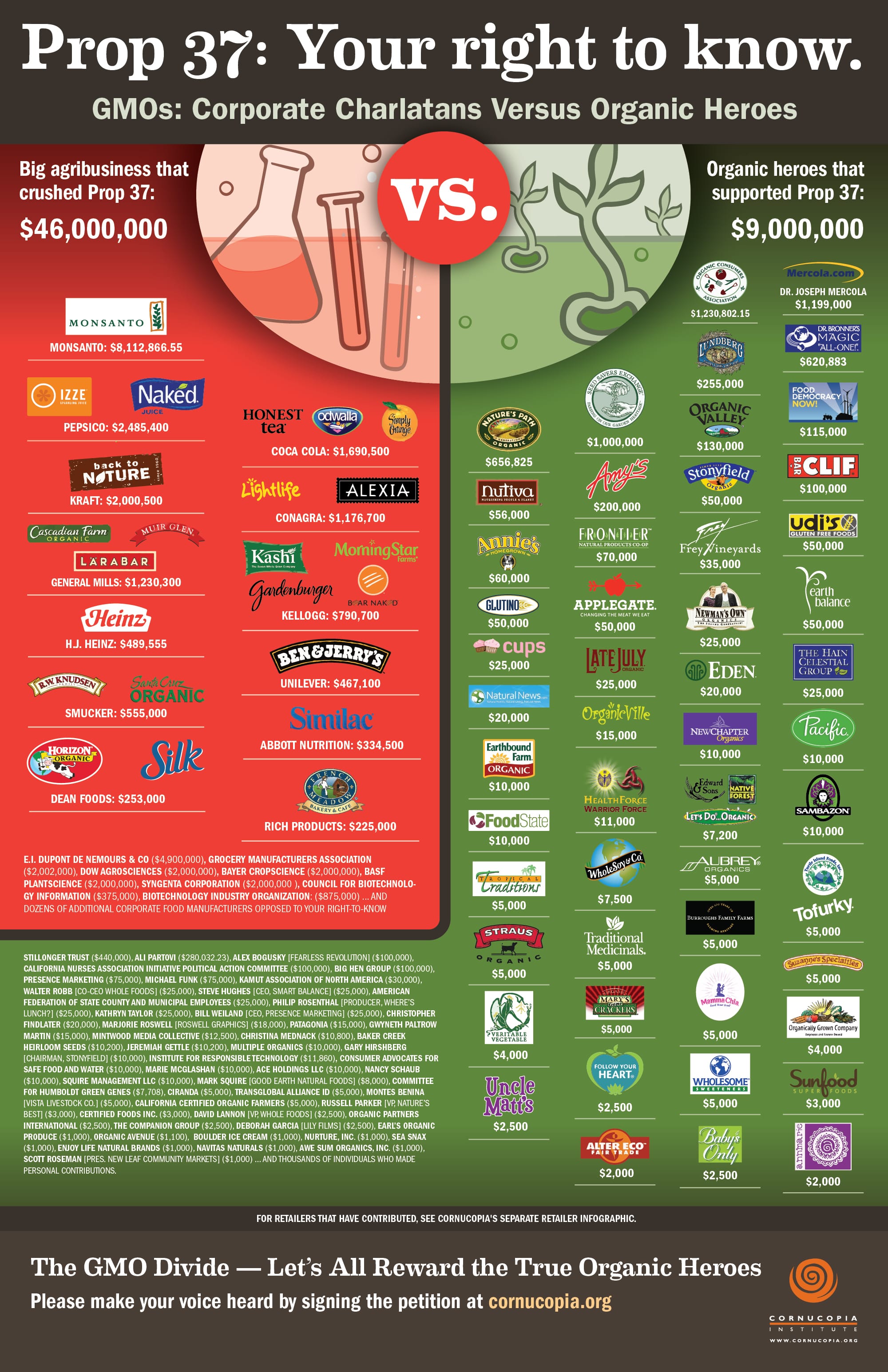15
Oct
Corporate Assault Targets California Voters in Attempt to Stop GE Labeling Proposition
(Beyond Pesticides, October 15, 2012) California’s Proposition 37, which would require mandatory labeling on genetically engineered (GE) foods, is facing a strong challenge as tens of millions of conventional food industry dollars have poured into television advertisements before the November 6th election. Poll results released Thursday by the Pepperdine University School of Public Policy and the California Business Roundtable show that 48.3% of respondents would vote yes for the measure on Nov. 6, while 40.2% would vote no.
Prop 37 was authored by James Wheaton, president of the Environmental Law Foundation. Earlier this year, the California Right to Know campaign gathered 971,126 petition signatures for Prop 37, nearly double the 555,236 signatures required to qualify for inclusion on the ballot. As it currently stands, over 40 countries around the world, including all of Europe, Japan, and China have the right to know whether they are eating GE food. While opponents of the initiative are attempting to mislead the public about the costs of the proposition, an economic assessment from Joanna M. Shepherd-Bailey, Ph.D. of Emory University School of Law reveals that the initiative would not result in any additional expense to the taxpayers of California; Prop 37 is self-enforced and requires no new bureaucracy.
However, money from corporate opponents of Prop 37 is fueling a media blitz, with “10 days of incessant pounding lies,” according to Stacy Malkan, media director for California Right to Know. Opponents of Prop 37 are portraying the labeling measure as a needless burden and waste of money. An image on its website shows a farmer with his mouth taped shut and his body crisscrossed by red tape -even though the proposal imposes no requirements on farmers.
Industry opponents of Prop 37 have now raised over $35 million in comparison to the $4 million raised by its supporters. This is a dramatic shift from earlier in the summer when both campaigns had raised nearly the same amount of money. A majority of the oppositional contributions have come from Monsanto, Bayer, Dupont, Dow, Pepsico, and other major conventional food and chemical companies.
But why are they fighting so hard to prevent a disclaimer on GE products? Because these large corporations know that Prop 37 will not just affect California. Historically, California initiatives have been harbingers of national environmental regulations. If Prop 37 passes it will likely force food processors to label GE products nationwide, since it would be costly and cumbersome to have one set of labels for California and another for the other 49 states. In a recent New York Times article, Michael Pollan notes that Prop 37 could help shift the food movement from focusing on the soft politics of changing consumer choice to engaging in the hard politics of Washington.
While not many studies have investigated the impacts of GE foods on mammals or even humans, the few studies that have looked at the toxicity of GE proteins identify human health concerns. Studies have found that GE foods may cause common toxic effects such as hepatic, pancreatic, renal, or reproductive issues and may alter hematological, biochemical parameters. World renowned geneticist and biophysicist, and co-founder of the International Science Panel on Genetic Modification, Dr. Mae-Wan Ho, has cited numerous observations on the adverse impacts of GE foods, including severe inflammation in the lungs in mice, liver and kidney toxicity, damage to the organ system of young rats fed GE potatoes, and severely stunted pups. Another recent study by Gilles-Eric SĂ©ralini, PhD, at the University of Caen in France reports that rats fed a diet of Roundup-tolerant GE corn have an increased risk of developing tumors, suffering organ damage and dying prematurely.
GE crops are also harmful to the environment. A recent study published by Washington State University’s research professor Charles Benbrook, PhD, finds that the use of herbicides in the production of three genetically engineered herbicide-tolerant crops -cotton, soybeans and corn- has actually increased, contrary to industry claims that the technology would reduce pesticide applications. Additionally, multiple studies show that the use of GE crops is leading to the rapid evolution of glyphosate-resistant weed populations.
Beyond Pesticides is a member of the Just Label It campaign and strongly supports voting yes on Prop 37 in California. Given national polls showing 93% of Americans in support of mandatory labeling, Beyond Pesticides believes it is possible to have the same impact here as in Europe, where consumers have known what is in their food since 1997.
As it currently stands, the only way to be certain you are not consuming GE foods is by purchasing products that are certified under the USDA organic certification program. Organic standards prohibit the use of genetic modification in the production and handling of organic food. For more information on the hazards of GE food, visit Beyond Pesticides’ Genetic Engineering program page.
Image Credit: The Cornucopia Institute
All unattributed positions and opinions in this piece are those of Beyond Pesticides.











